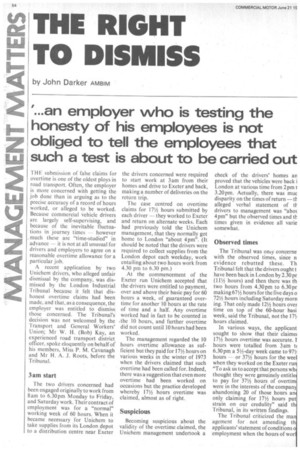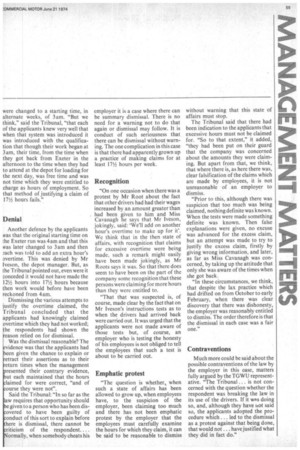THE RIGHT TO DISMISS
Page 56

Page 57

If you've noticed an error in this article please click here to report it so we can fix it.
by John Darker AMBIM
...an employer who is testing the honesty of his employees is not obliged to tell the employees that such a test is about to be carried out
THE submission of false claims for overtime is one of the oldest ploys in road transport. Often, the employer is more concerned with getting the job done than in arguing as to the precise accuracy of a record of hours worked, or alleged to be worked. Because commercial vehicle drivers are largely self-supervising, and because of the inevitable fluctuations in journey times however much these are "time-studied" in advance — it is not at all unusual for drivers and employers to agree on a reasonable overtime allowance for a particular job.
A recent application by two Unichem drivers, who alleged unfair dismissal by the company, was dismissed by the London Industrial Tribunal because it felt that dishonest overtime claims had been made, and that, as a consequence, the employer was entitled to dismiss those concerned. The Tribunal's decision was not welcomed by the Transport and General Workers' Union; Mr W. H. (Bob) Kay, an experienced road transport district officer, spoke eloquently on behalf of his members, Miss P. M. Cavanagh and Mr H. A. J. Roots, before the Tribunal.
3am start
The two drivers concerned had been engaged originally to work from 8 am to 6.30 pm Monday to Friday, and Saturday work. Their contract of employment was for a "normal" working week of 60 hours. When it became necessary for Unichem to take supplies from its London depot to a distribution centre near Exeter the drivers concerned were required to start work at 3am from their homes and drive to Exeter and back, making a number of deliveries on the return trip.
The case centred on overtime claims for 171/2 hours submitted by each driver — they worked to Exeter and return on alternate weeks. Each had previously told the Unichem management, that they normally got home to London "about 4pm". (It should be noted that the drivers were required to collect supplies from the London depot each weekday, work entailing about two hours work from 4.30 pm to 6.30 pm.) At the commencement of the Exeter run Unichem accepted that the drivers were entitled to payment, over and above their basic pay for 60 hours a week, of guaranteed overtime for another 10 hours at the rate of time and a half. Any overtime worked had in fact to be counted in .the 10 hours, and further overtime did not count until 10 hours had been worked.
The management regarded the 10 hours overtime allowance as sufficient but they paid for 171/2 hours on various weeks in the winter of 1973 when the drivers claimed that such overtime had been called for. Indeed, there was a suggestion that even more overtime had been worked on occasions but the practice developed whereby 171/2 hours overtime was claimed, almost as of right.
Suspicious
Becoming suspicious about the validity of the overtime claimed, the Unichem management undertook a check of the drivers' homes an proved that the vehicles were back i London at various time from 2pm t 3.20 pm. Actually, there was rnuc disparity on the times of return — th alleged verbal statement of th drivers to management was "abot 4 pm" but the observed times and th times given in evidence all vane somewhat.
Observed times
The Tribunal was omy concerne with the observed times, since n evidence rebutted these. Th Tribunal felt that the drivers ought t have been back in London by 2.30 pr (111/2 hours) and then there was th two hours from 430pm to 6.30pr making 671/2 hours for the five days o 721/2 hours including Saturday morn ing. That only made 121/4 hours over time on top of the 60-hour basi week, said the Tribunal, not the 171/ hours claimed.
In various ways, the applicant sought to show that their claimec 171/2 hours overtime was accurate. I hours were totalled from 3am tc 6.30 pm a 51/2-day week came to 971 hours — or 371/2 hours for the wee when they worked on the Exeter ru "To ask us to accept that persons wh thought they were genuinely entitle to pay for 371/2 hours of overtim were in the interests of the compan abandoning 20 of those hours an only claiming for 171/2 hours put strain on our credulity" said th Tribunal, in its written findings.
The Tribunal criticized the ma agement for not amending th applicants' statement of conditions o employment when the hours of wor were changed to a starting time, in alternate weeks, of 3am. "But we think," said the Tribunal, "that each of the applicants knew very well that when that system was introduced it was introduced with the qualification that though their work began at 3am, their time, from the time when they got back from Exeter in the afternoon to the time when they had to attend at the depot for loading for the next day, was free time and was not time which they were entitled to charge as hours of employment. So that method of justifying a claim of 171/4 hours fails."
Denial
• •
Another defence by the applicants was that the original starting time on the Exeter run was 4am and that this was later changed to 3am and then each was told to add an extra hour's overtime. This was denied by Mr Iveson, the depot manager. But, as the Tribunal pointed out, even were it conceded it would not have made the 121/2 hours into 171/2 hours because then work would before have been reckoned from 4am.
Dismissing the various attempts to justify the overtime claimed, the Tribunal concluded that the applicants had knowingly claimed overtime which they had not worked; he respondents had shown the eason relied on for dismissal.
Was the dismissal reasonable? The vidence was that the applicants had een given the chance to explain or etract their assertions as to their eturn times when the management resented their contrary evidence, ut each maintained that the hours !aimed for were correct, "and of ourse they were not".
Said the Tribunal: "In so far as the aw requires that opportunity should e given to a person who has been disovered to have been guilty of onduct of this sort to explain before here is dismissal, there cannot be riticism of the respondent... . ormally, when somebody cheats his employer it is a case where there can be summary dismissal. There is no need for a warning not to do that again or dismissal may follow. It is conduct of such seriousness that there can be dismissal without warning. The one complication in this case is that there had apparently grown up a practice of making claims for at least 171/2 hours per week.
Recognition
"On one occasion when there was a protest by Mr Root about the fact that other drivers had had their wages increased by an amount greater than had been given to him and Miss Cavanagh he says that Mr lveson, jokingly, said: 'We'll add on another hour's overtime to make up for it'. We think that in the then state of affairs, with recognition that claims for excessive overtime were being made, such a remark might easily have been made jokingly, as Mr Roots says it was. So that there does seem to have been on the part of the company some recognition that these persons were claiming for more hours than they were entitled to.
"That that was suspected is, of course, made clear by the fact that on Mr Iveson's instructions tests as to when the drivers had arrived back were carried out. It was urged that the applicants were not made aware of those tests but, of course, an employer who is testing the honesty of his employees is not obliged to tell the employees that such a test is about to be carried out.
Emphatic protest
"The question is whether,, when such a state of affairs has been allowed to grow up, when employees have, to the suspicion of the employer, been claiming too much and there has not been emphatic protest by the employer that the employees must carefully examine the hours for which they claim, it can be said to be reasonable to dismiss without warning that this state of affairs must stop.
The Tribunal said that there had been indication to the applicants that excessive hours must not be claimed for. "So to that extent," it added, "they had been put on their guard that the company was concerned about the amounts they were claiming. But apart from that, we think, that where there is, as here there was, clear falsification of the claims which are made by employees, it is not unreasonable of an employer to dismiss.
"Prior to this, although there was suspicion that too much was being claimed, nothing definite was known. When the tests were made something definite was known. Then false explanations were given, no excuse was advanced for the excess claim, but an attempt was made to try to justify the excess claim, firstly by giving wrong information, and later, as far as Miss Cavanagh was concerned, by taking up the attitude that only she was aware of the times when she got back.
"In these circumstances, we think, that despite the lax practice which had drifted on from October to early February, when there was clear discovery that there was dishonesty, the employer was reasonably entitled to dismiss. The order therefore is that the dismissal in each case was a fair one."
Contraventions
Much more could be said about the possible contraventions of the law by the employer in this case, matters fully argued by the TGWU representative. "The Tribunal.., is not concerned with the question whether the respondent was breaking the law in its use of the drivers. [fit was doing so, and, although they have not said so, the applicants adopted the procedure which. . . led to the dismissal as a protest against that being done, that would not ... have justified what they did in fact do."








































































































